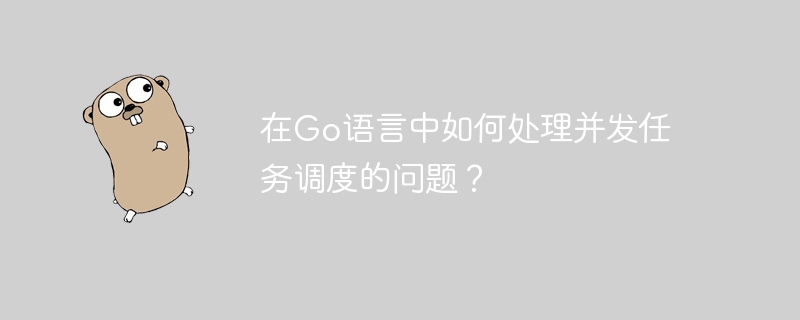

How to deal with concurrent task scheduling in Go language?
With the rapid development of computer technology, there are increasing demands for processing concurrent tasks. As a programming language with concurrent programming as its core feature, Go language provides a rich set of concurrent programming models and tools, which can well solve the problem of concurrent task scheduling.
In the Go language, you can use goroutine and channel to handle the scheduling of concurrent tasks. Goroutine is a lightweight thread in the Go language that can start multiple concurrent tasks in the program. Channel is a mechanism for communication between goroutines, used to send and receive data.
Below we use a specific example to demonstrate how to handle concurrent task scheduling in the Go language. Suppose we have a requirement: to obtain data from a list of 1000 URLs. We want to make these 1000 requests in parallel and store the data returned by each request into a result list.
First, we need to define a structure to represent the return result of each URL:
type Result struct {
url string
data []byte
error error
}Then, we define a function to get the data of the URL and return the Result object:
func fetch(url string) Result {
resp, err := http.Get(url)
if err != nil {
return Result{url: url, error: err}
}
defer resp.Body.Close()
body, err := ioutil.ReadAll(resp.Body)
if err != nil {
return Result{url: url, error: err}
}
return Result{url: url, data: body}
}Next, we define a function to concurrently obtain URL data:
func fetchAll(urls []string) []Result {
results := make([]Result, len(urls))
ch := make(chan Result)
for _, url := range urls {
go func(u string) {
ch <- fetch(u)
}(url)
}
for i := 0; i < len(urls); i++ {
result := <-ch
results[i] = result
}
return results
}In the above code, we loop through multiple goroutines to execute the fetch function and send the results to a channel . Then the results are received from the channel through a loop and stored in the result list.
Finally, we can call the fetchAll function to get the URL data and print the results:
func main() {
urls := []string{
"https://www.google.com",
"https://www.github.com",
// ... 其他URL
}
results := fetchAll(urls)
for _, result := range results {
if result.error != nil {
fmt.Printf("Error fetching %s: %s
", result.url, result.error)
} else {
fmt.Printf("Fetched %s: %d bytes
", result.url, len(result.data))
}
}
}The main function in the above code defines a URL list and calls the fetchAll function to get the URL data , and print the result.
Through the above examples, we can see that dealing with concurrent task scheduling issues in the Go language is relatively simple. Through the combined use of goroutine and channel, we can easily implement concurrent task scheduling and gain the ability to execute in parallel.
To summarize, to deal with concurrent task scheduling issues in the Go language, we can use goroutine and channel to achieve it. Through the concurrent execution of goroutine and the communication mechanism of channel, we can easily start multiple concurrent tasks and obtain the execution results of the tasks. This concurrent programming model and tools enable us to handle concurrent tasks more efficiently and improve program performance and responsiveness.
The above is the detailed content of How to deal with concurrent task scheduling in Go language?. For more information, please follow other related articles on the PHP Chinese website!




